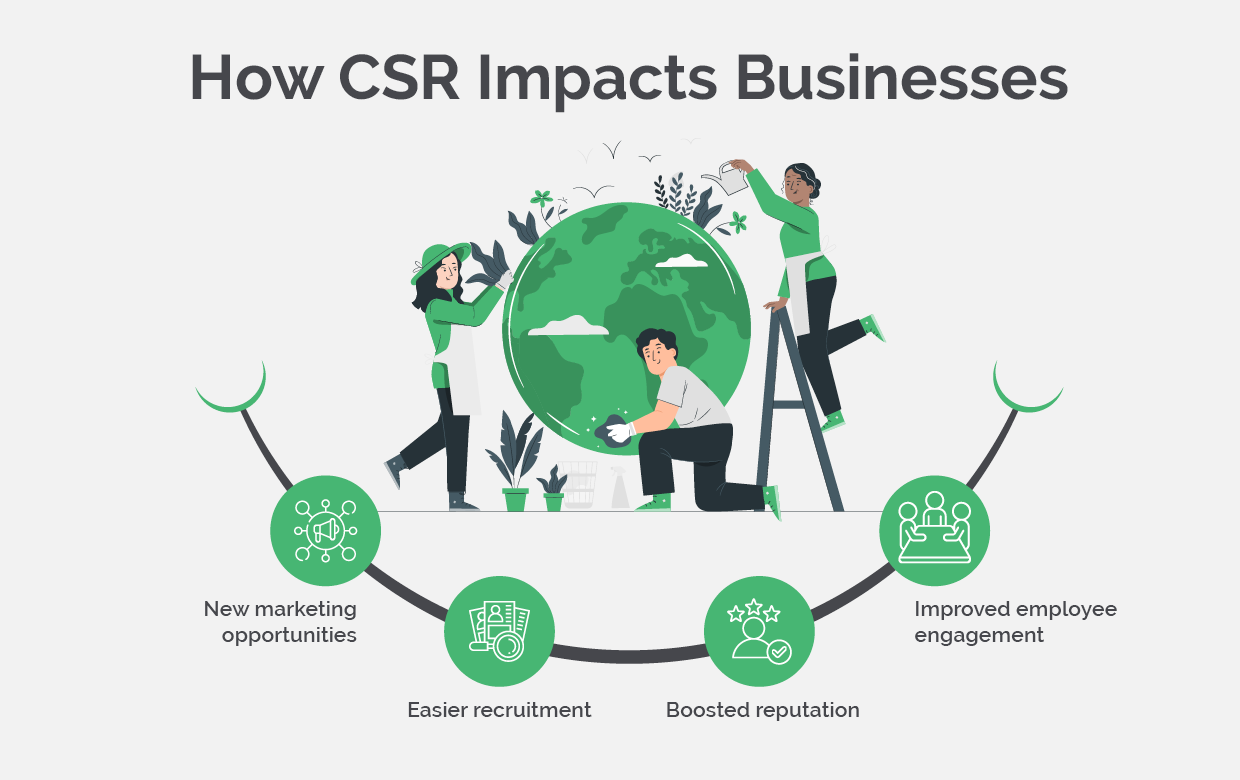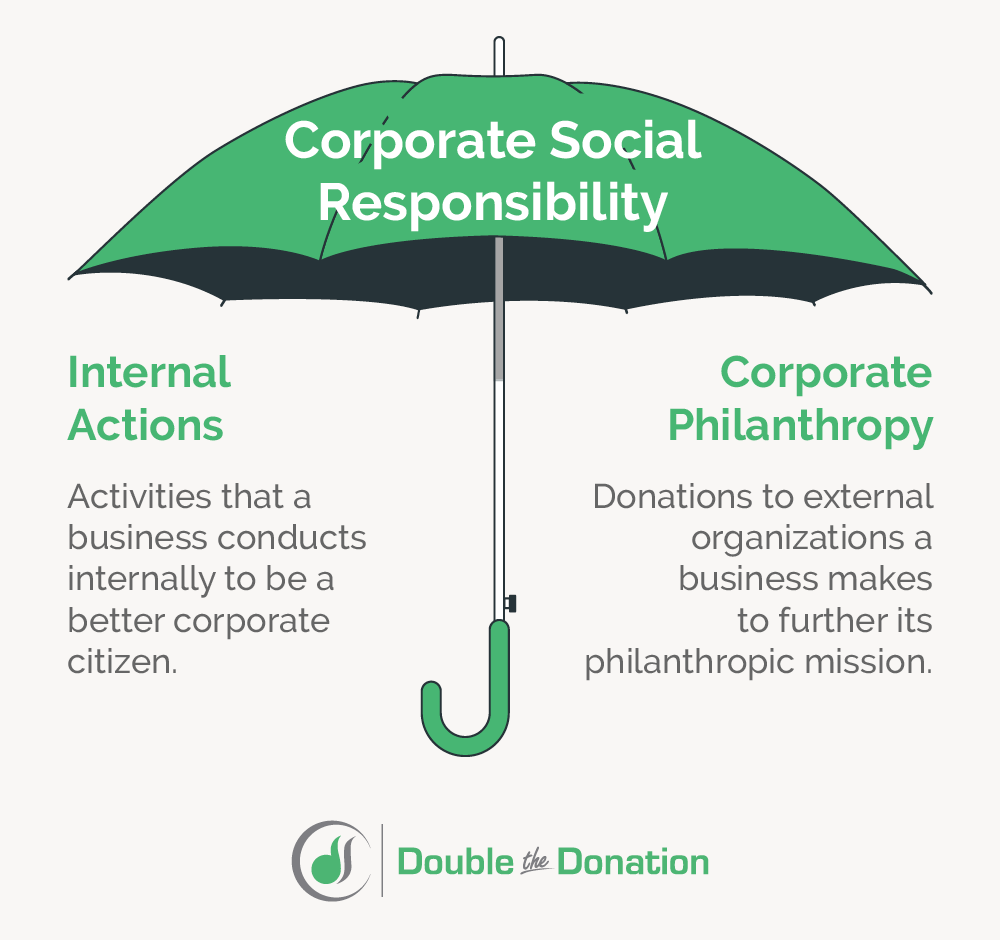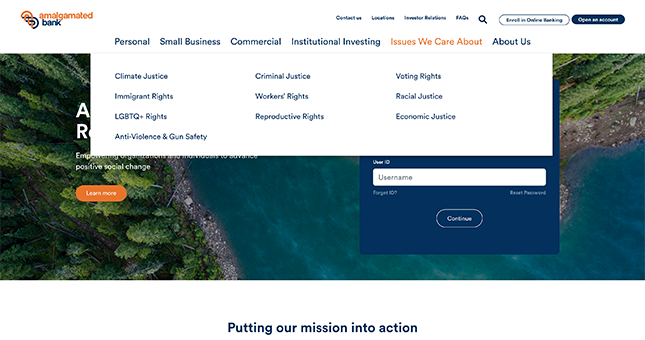Companies Committing Social Good: 7 Real-World CSR Examples
Trends in corporate philanthropy show that corporate social responsibility (CSR) programs are on the rise among companies of all sizes. While large corporations have more resources to set aside for CSR, small and medium-sized businesses can make meaningful impacts in their communities without breaking the bank.
The first step for creating a winning CSR strategy is to know what’s possible for your business. That’s why business leaders who are serious about CSR should look outwards to see what other companies have accomplished through their social good programs.
To help your research, we’ll look at seven companies with thriving CSR programs and provide insight into how you can incorporate their strategies into your initiatives. While many of these are large companies, it’s possible to adapt their practices and scale them down to fit even small businesses’ resources and capabilities.
But first, let’s explore why companies offer CSR programs and the sheer variety of ways you can approach CSR at your business.
Why do companies participate in corporate social responsibility?
CSR benefits society. Nonprofits receive donations, the environment gets cleaned up, and employees have safe and healthy working conditions. These are all obvious reasons why CSR is a positive force, but what do the companies paying for these initiatives get in return?
It turns out businesses committed to CSR can more than make up their investment. They can expect benefits like:
- New marketing opportunities. Some CSR programs involve partnering with third-party organizations, usually nonprofits. To say thanks, these charitable organizations will promote your business to their supporters, opening up new marketing channels and giving you a foot in the door with new customers.
- Easier recruitment. Along with holding on to the employees you have, CSR also helps businesses find and recruit top talent. For instance, if your company is committed to the CSR practice of prioritizing worker safety, health, and well-being, word-of-mouth about your positive work environment will likely spread, resulting in more qualified applicants.
- Boosted reputation. Just as employees want to work for employers committed to social good, customers want to shop at ethical businesses. For example, let’s say you have the choice of buying two products of fairly equal quality, and one brand has a spotted history with CSR while the other pledges to donate a portion of proceeds to good causes. In this situation, most buyers would select the business with a positive reputation.
- Improved employee engagement. Employees tend to work harder, care more about the quality of their work, and stick with their employer when they feel like they are working for a good cause. By doing good in your community and implementing socially responsible internal practices, you’ll help employees feel more engaged, increasing productivity and loyalty.
The benefits your business gains depend on the type of CSR program you offer. For example, will you focus on internal practices to engage employees, explore external philanthropy to connect with your community, or try a mix of both approaches?
What are the types of corporate social responsibility?
CSR is ultimately an umbrella term that consists of all the activities a company does to further social good. This includes both how the company conducts itself internally and the philanthropic donations the organization makes.
To give you a sense of the sheer variety of CSR programs, here’s a brief list of some of the most common types of CSR:
- Employee giving. Workplace giving programs involve facilitating donations to nonprofits by encouraging your employees to donate. To encourage employee donations that align with the company’s mission, many businesses provide their teams with information about specific nonprofits they recommend. Corporations can also boost employee donations by offering to match their gifts, usually at a dollar-per-dollar rate. Although, some businesses match at a 2:1 or even 3:1 ratio.
- Sustainability. Sustainable companies are positive for the environment and signal to investors that their business can go the distance. CSR programs focused on sustainability usually involve reducing their carbon footprint, eliminating waste in the production process, taking accountability for any environmental clean-up needs, and using renewable energy sources.
- Volunteerism. Rather than asking employees to donate their paychecks, businesses can enable them to donate their time. Volunteerism programs include team volunteer days wherein the business organizes a volunteer activity in partnership with a nonprofit, volunteer time off where employees can take paid time off to volunteer, and volunteer grants where businesses donate to nonprofits based on how many hours their employees volunteered.
- Adherence to workers’ rights. Treat workers with respect by providing fair wages, creating an equitable and diverse workplace, promoting employee health and wellbeing, and using supply chains that follow ethical labor practices.
- Sponsorships. As mentioned, philanthropic donations fall under the umbrella of CSR. This can involve making monetary donations, donating supplies or specialized services, or promoting nonprofit causes.
- Grantmaking. Some businesses, usually large corporations, establish grantmaking foundations as part of their CSR efforts. These organizations have a specific focus area for which they provide grants, such as advocacy, environmentalism, or economic equality.
Whether you plan to launch several or just one CSR initiative, software can help you organize and monitor your program. While CSR software providers have various focus areas, most solutions allow businesses to track employee donations, manage grants, facilitate nonprofit relationships, and oversee matching gift requests.
1. TOMs
Shoe retailer TOMs has made CSR a part of its brand to the point of becoming a Certified B Corporation, meaning the company meets high standards for social impact, environmental protection, and accountability. Not only has TOMs achieved this honor, but the organization has boosted its initial score of 96.3 in 2018 to 121.5 in 2021, all while the median score for businesses hovers at just 50.9.
TOMs takes a multi-pronged approach to CSR, dividing its efforts into three categories:
- Purpose. TOMs aims to create a more equitable world by supporting grassroots nonprofits. As such, TOMs donates a third of its profits to nonprofit organizations specializing in boosting mental health, increasing access to opportunities, and ending gun violence.
- Planet. TOMs seeks to improve its business’s environmental friendliness in multiple ways, specifically by using sustainable and recycled materials. Currently, 80% of TOMs’ packaging is made from recycled materials, and the company aims to use 100% sustainably grown cotton by 2025.
- People. In addition to giving to nonprofits, TOMs aims to improve internally by positioning their organization as anti-racist, launching volunteer initiatives on Giving Tuesday, and working with suppliers that share its values.
TOMs is proud of the impact it has made so far and only aims to improve its CSR programs in the future.
CSR Takeaway
There’s no need to choose just one type of CSR program for your business. Taking a multifaceted approach to CSR like TOMs allows your business to engage employees, build a positive reputation with customers, and connect with like-minded organizations.
Conduct an internal assessment and determine what improvements you can make right away and what may take a few years for your company to accomplish. For instance, you may be able to set up a long-term partnership with a nonprofit organization within a few months but need several years to reduce your carbon footprint.
2. PayPal
PayPal’s payment processing services need little introduction, but many may be less familiar with how they use this technology to help charities earn more donations through the PayPal Giving Fund.
Essentially, the PayPal Giving Fund supports charitable organizations through this four-step process:
- Charities create a registered account with PayPal. Registered charities will receive PayPal’s low processing fee rates and access to donation opportunities on PayPal and its partner organizations, including GoFundMe, eBay, and Humble Bumble.
- Supporters donate through PayPal, eBay, or another PayPal partner. Many PayPal partners will even cover processing fees for charities, making donations to nonprofits go even further.
- PayPal receives the donation and provides the donor with a receipt. PayPal will use this information to provide participating charities with monthly donation reports.
- The funds are added to the charity’s PayPal account. In addition to individual donors’ gifts, charities can receive grants and major gifts through PayPal.
Along with ensuring donations are securely processed, PayPal’s extensive partner network helps nonprofits receive funds from a variety of sources.
CSR Takeaway
This CSR program takes advantage of the technology PayPal already has to help nonprofit organizations. Assess your business’s products and services and whether they would benefit charitable organizations in your community. If so, you can provide your offerings at a reduced cost or even for free to nonprofits for a philanthropic CSR program.
3. FP Markets
FP Markets is a financial trading service that allows customers to trade Forex, CFDs, Indices, Shares, Commodities, Metals, and Bonds. FP Markets is also committed to CSR, stating that its mission is to: “Actively contribute to the well-being of communities and the environment. Through sustainable practices, philanthropic initiatives, and ethical decision-making, we aim to make a positive impact on society, fostering a better future for all. Our projects across multiple sectors reflect this goal, promoting change and fostering a healthier, more equitable world.”
Currently, FP Markets has two unique CSR programs worth highlighting:
- Men’s Health. FP Markets focused on promoting advocacy for overlooked health issues that affect men. Specifically, this included prostate and testicular cancer, as well as mental health support.
- Cricket Brazil Youth Development Programme. In this example of philanthropic CSR, FP Markets partnered with a Brazilian youth cricket organization to support young athletes and create a positive difference in their communities.
As these two causes show, FP Markets is interested in making a difference globally and partnering with a variety of charitable causes, no matter where they’re located.
CSR Takeaway
Your business doesn’t need to build an entirely new program to serve your community. Rather, try partnering with nonprofits in your area and support them through sponsorships and marketing assistance. These organizations already have the research, resources, and infrastructure to fulfill their charitable missions that align with your CSR goals.
4. Toast
Toast.org is the foundation founded by Toast, a point-of-sale software vendor for restaurants. Just as its products revolve around the food industry, Toast’s CSR program also revolves around food. Through its foundation, Toast aims to address hunger and provide access to healthy food.
Toast also encourages its employees and customers to participate in this mission. To motivate employees, Toast offers a matching gift program, which saw a 48% participation rate in 2022. Additionally, through its software, Toast provides restaurants with features to track and reduce food waste.
CSR Takeaway
When selecting your CSR mission, consider what areas of focus make sense for your business. Determine what you have the resources to accomplish, what needs your business and community face, and how your mission impacts your brand.
Many companies do have CSR missions that are unrelated to their business, such as Coca-Cola providing scholarships for higher education. However, a mission that aligns with your products or services can make your brand memorable and allow you to better connect with new audiences that discover your business through your CSR program.
5. Amalgamated Bank
Amalgamated Bank brands itself as “America’s most socially responsible bank,” meaning CSR is a core part of its strategies. For instance, while companies are proud of their CSR programs, most businesses organize information about their initiatives in a sub-menu on their website. In contrast, Amalgamated Bank proudly displays an “Issues We Care About” button on their main menu, prompting visitors to explore the wide range of issues supported, including:
- Climate Justice
- Immigrant Rights
- LGBTQ+ Rights
- Anti-Violence & Gun Safety
- Criminal Justice
- Workers’ Rights
- Reproductive Rights
- Voting Rights
- Racial Justice
- Economic Justice
For each of these issues, Amalgamated Bank takes a proactive stance. Its CSR efforts range from offering pro-bono services to support nonprofit organizations to not doing business with parties they feel are harmful, such as fossil fuel companies.
CSR Takeaway
Your business can conduct CSR in many ways. If there’s a focus area you care about but don’t have the resources to launch an entire program for, consider how else you can support it. For instance, if you’ve already used up your philanthropic budget donating to economic equality groups, you might organize a corporate volunteer day with an environmental organization to plant trees.
Additionally, CSR benefits companies by associating their business’s name with a good cause. There’s no need to be modest about your organization’s work to assist nonprofits, create a positive work environment for employees, and be a better corporate citizen. When you promote your CSR efforts, you’ll attract customers and employees who share your values, creating a positive and productive environment.
6. Unilever
You may not have heard of Unilever, but chances are that you’ve used one of its products. Unilever is the parent company of many well-known ice cream and personal care brands, including Ben & Jerry’s, Dove, and Knorr. With all these successful businesses operating under its umbrella, Unilever is a massive corporation with the resources to make a massive CSR impact.
Through its Unilever Compass social good program, the company conducts CSR programs for the following focus areas:
- Climate change
- Environmental preservation and reforestation
- Waste reduction
- Increasing the global standard of living
- Human rights
- Corporate transparency and accountability
One unique CSR initiative Unilever offers is its Future of work program. With advances in automation and AI, the necessary skills employees need to stay competitive in the job market are rapidly changing. In a partnership with UNICEF, Unilever’s Future of work program aims to help 10 million young people between the ages of 15 and 24 learn the skills they need to find employment, provide more flexible working options for Unilever’s current teams, and re- or upskill employees at its businesses to adapt to the digital age.
CSR Takeaway
You don’t need to be a massive corporation like Unilever to offer urgent CSR initiatives. Assess your employees’ and customers’ needs to offer programs currently in demand. After launching your CSR program, continue checking in with its beneficiaries to ensure your services are still needed and stay aware of other in-demand focus areas you may want to branch out into.
7. Bombas
Specializing in socks, Bombas is a clothing company that gets its customers involved in its CSR initiative. Workplace giving programs are popular because they allow employees to feel like they are taking an active role in making a difference, and the same principle applies to shop for a cause programs like the one Bombas offers.
Essentially, whenever a customer buys a t-shirt, pair of socks, or underwear—the three most requested items at homeless shelters—Bombas will donate the same item to one of their nonprofit partners, who then distribute the clothing to those in need.
CSR Takeaway
Determine how much you want your customers and employees to get involved in your CSR program. Some initiatives, like establishing a charitable foundation, are usually influenced very little by customers or employees, allowing the companies that operate them to act more independently.
However, programs that engage stakeholders are far more public and help businesses make CSR a part of their brand identity. Plus, initiatives like shop for a cause programs can lead to positive business outcomes. After all, if a buyer knows each item they purchase results in a donation, they’re likely to buy more than they normally would.
Corporate Social Responsibility Examples: More Resources
There are as many ways to approach CSR as there are businesses operating. The examples in this guide are a strong place to start to inspire your own CSR efforts to positively impact your community, all while boosting relationships with customers and employees.
Of course, to create the transformative programs listed here, these companies started with a strong foundational knowledge of CSR best practices. Continue to expand your business’s expertise with resources like these:
- Corporate Citizenship: Creating Meaningful Community Impact. CSR is about being a good corporate citizen. Explore the nuances of how to make an impact in this guide.
- Top 7 Employee Engagement Companies Leading By Example. CSR efforts can boost employee engagement. Discover the intersection of employee engagement and CSR with these real-world examples.
- CSR in Action: 7 Corporate Social Responsibility Examples. Interested in exploring even more examples of CSR programs? Check out this guide to discover the vast world of CSR.















